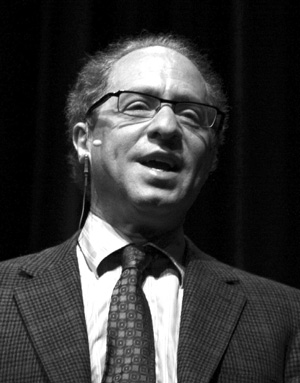Fourth Way Perspectives
The Meaning of Human Life
in the Technological World-Time
Mankind has passed through many World-Times, each characterized by its primary means of organizing and sustaining life. Hunter-Gatherer, Agrarian, Industrial, Scientific-Industrial and now today's Technological—each is a World-Time. With each reorganization our activities, values, forms and customs change. Before the Technological, no World-Time has put in question the very essence of the meaning of human life. How we answer it—or how we allow it to be answered for us—will determine our future.

The word Technology is used in its broadest sense—sociologically, intellectually, emotionally, sexually and spiritually—in ways never before conceived. The marvels and the powers it offers are many. It excites us by diminishment of time and space and offers the capability to look ever more deeply into the workings of Nature, so that climate might be controlled, human life extended, and age-old maladies cured or alleviated.
 Ray Kurzweil
Ray KurzweilSingularity University, the brainchild of speech recognition software genius Raymond Kurzweil, has drawn many of Silicon Valley's wealthiest technocrats, such as Google's cofounder Larry Page, to embrace its techno-utopian vision of Singularity, in which, within several decades, a superior technological intelligence will assimilate all human thinking power and thus surpass human thinking. Predicts Kurzweil, "We will transcend all of the limitations of our biology." In his latest book, The Singularity Is Near, he posits: "Once non-biological intelligence gets a foothold in the human brain (this has already started with computerized neural implants), the machine intelligence in our brains will grow exponentially (as it has been doing all along), at least doubling in power each year. Ultimately, the entire universe will become saturated with our intelligence. This is the destiny of the universe." [Emphasis added.] If Kurzweil's techno-dream comes true, it won't be our intelligence but a hybrid machine-human intelligence with machine dominating.
There are deeper problems with Singularity for Kurzweil and friends (many are passionate readers of Ayn Rand's The Fountainhead and Atlas Shrugged) that Internet pioneer David Gelernter addresses in his essay "Dream-Logic, The Internet and Artificial Thought." He agrees that a computer can be built that "seems" to think, however:
It would be a zombie. The computer would have no inner mental world; would in fact be unconscious. But in practical terms, that would make no difference. The computer would ponder, converse and solve problems just as a man would.
But first there are formidable technical problems. For example: there can be no cognitive spectrum without emotion. Emotion becomes an increasingly important bridge between thoughts as focus drops and re-experiencing replaces recall. Computers have always seemed like good models of the human brain; in some very broad sense, both the digital computer and the brain are information processors. But emotions are produced by brain and body working together. When you "feel happy," your "body" feels a certain way; your mind notices; and the resonance between body and mind produces an emotion.
The natural correspondence between computer and brain doesn't hold between computer and body. Yet artificial thought will require a software model of the body, in order to produce a good model of emotion, which is necessary to artificial thought. In other words, artificial thought requires artificial emotions, and simulated emotions are a big problem in themselves. (The solution will probably take the form of software that is "trained" to imitate the emotional responses of a particular human subject.)
One day all these problems will be solved; artificial thought will be achieved. Even then, an artificially intelligent computer will experience nothing and be aware of nothing. It will say "that makes me happy," but it won't feel happy. Still: it will "act" as if it did. It will act like an intelligent human being.
And then what?
"And then what" may be "The First Church of Robotics." The title of a recent article in the New York Times by Jaron Lanier, an artificial intelligence expert. He gives a dire warning of just where Singularity is leading. A technical elite, he says, is creating "a new religion, expressed through an engineering culture." It will be their "own ultramodern religion, and it is one in which people are told to wait politely as their very souls are made obsolete." What past World-Times saw as central to what it means to be a human being—our spirituality— would then be reinterpreted in terms of Technology.
Singularity and robotic religion isn't here yet, but technological advances in communication and finance have fueled the ever-growing mania of greed in the corporate world whose aim is, like Alexander of Macedonia, to conquer the world, but economically, not with foot soldiers. In a word: to be the world's investment banking firm, and so forth. This began in the 1970s when U.S. companies began to outsource overseas our country's manufacturing base (not only because of lower wages but also to evade governmental oversight and union contracts). The clever reasoning was that we would keep the knowledge work and let the rest of the world do the grunt work. But now we've lost a great share of the knowledge work to India and places east. What jobs are left are being pared to the bone in order for corporations to make even greater profits in their race to the world economic summit.
There are many examples of this profit mania and how it destroys human relationships, but one of the most recent is that of the contract dispute within $5.5 billion beverage conglomerate Dr. Pepper Snapple Group. It owns Mott, the profitable apple juice maker, but is demanding from its employees a $1.50-an-hour wage cut, a pension freeze and other concessions. The reason: to bring plant costs in line with "local and industry standards." A 24-year-employee on the union's bargaining team said the plant manager told them flat out during negotiations, "You're a commodity like soybeans and oil, and the price of commodities goes up and down." In the current, all-consuming, dog-eat-dog business world, yesterday's ideal of the company and its employees as "family" is, well, "so yesterday."
 2009 Polyamory Pride Parade in San Francisco
2009 Polyamory Pride Parade in San FranciscoIf economically this World-Time has radically changed relationships, the same is true sociologically. Our sense and value of ourselves as human beings is being remodeled as our attention is devoured by the abstractions of virtual realities, fantasies, video games, violence and vulgarity. Intimate friends now "Facebook friends"; sex reduced to hooking up, sex-dating, becoming a "f**k-buddy"; polyamory thrives; gay adoption increases and third sex marriage hovers; tattoos, nose and tongue rings and even more intimate piercings are the fashion of the day; "medical marijuana" the new growth industry; New Age hubristic "individuality," channeling and be-my-own-spiritual-teacher predominate; Mammon is king. "When money talks," said one CEO, "ideology walks." The animal is up out of the cellar, on parade in the streets and boardrooms and pontificating in the halls of Congress and the Senate.
And what is to be done? Society gone sick with systemic corruption on all levels is pulling apart, rage and depression mounting, the financial debacle, the foreclosures and loss of jobs growing, 44 million people living in poverty last year, up 14 percent from the year previous, gold at record highs, the devaluation of the dollar imminent, the American Dream of progress, higher education, owning one's own home, living a better life than one's parents all now broken. What is to replace it? No one knows, but demagogues are out on the hustings....
 Robots now have skin that responds to the pressure of human touch. They can converse, play games and are programmed to be moral.
Robots now have skin that responds to the pressure of human touch. They can converse, play games and are programmed to be moral.And so deep down the concern of everyone is understandably of survival, of pulling in, getting through it. And the meaning of human life? That seems so abstract. Sophomoric. And even if answered—what good would it do? We don't have the time.
But what is it that will survive? That is, who am I that is going to survive? What is this "I"? And how can "I" know "I"?
And so we come not just to survival but to the question of spiritual survival in this Technological World-Time. If human life is to have any meaning beyond itself—mere eating and breathing and socializing and pleasuring and perhaps procreating—then there must be a higher meaning, a spiritual meaning.
If we let Technology answer for us:
It will seem natural that we exist merely as bioplasmic machines, a form of worker ants, each stamped with a bar code, totally enframed in a sterile, Technological World-Time. Such a machine world running on its "oil"—water to keep it cool and electricity for power—would impoverish all humanity. The human experiment on Earth would be over—a human and spiritual catastrophe, a binary hell world, from which there would be no escape.
—The Editor
Notes
1.
World-Times. Passing from the Hunter-Gatherer to the Agrarian and then the Industrial it was comparatively easy for societies to assimilate as the change from one World-Time to another moved at a glacial pace. But the demands of assimilation changed with the dwarfing of time between the advent of the Industrial in the early 1800s to the Scientific-Industrial in the early 1900s, the former noted for factories, furnaces and city life, the latter for scientific-management techniques and assembly-line production. The first stirrings of our Technological World-Time began with the computer in the 1940s, the semiconductor and discovery of DNA in the 1950s, quickly followed by the microprocessor, Artificial Intelligence, and now ends its infancy with the Internet, robotics and nanotechnology.
2. The First Church of Robotics. Jaron Lanier, New York Times, 9 August 2010.
3. We will transcend all of the limitations. Ashlee Vance, "Merely Human? So Yesterday," New York Times, 13 June 2010. With Singularity still a ways off, 62-year-old Kurzweil hopes to avoid old age by taking 150 pills a day and having regular intravenous procedures.
4. David Gelernter, "Dream-Logic, The Internet and Artificial Thought," Frankfurter Allgemeine Zeitung, 22 June 2010, Frankfurt, Germany. Gelernter, professor of computer science at Yale University, made seminal contributions to the field of parallel computation. His right hand and eye were permanently damaged when opening a mailbomb sent by Theodore Kaczynski, the "Unabomber."
5. A commodity like soybeans. Steven Greenhouse, "In Mott's Strike, More Than Pay at Stake," New York Times, 18 July 2010.
6. F***k buddy. This is just a level above masturbation, a waste of being-exioehary, an off-loading of tension.
7. It will seem natural. William Patrick Patterson, Spiritual Survival in a Radically Changing World-Time (San Anselmo, CA: Arete Communications, 2009), p. 6.